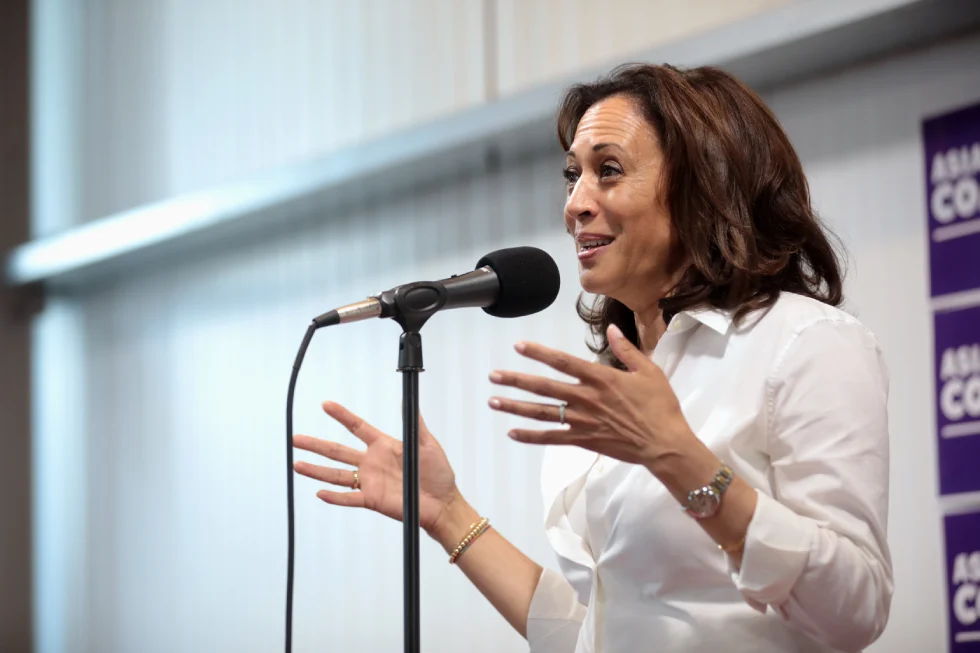On July 21, Vice President Kamala Harris announced her candidacy for the 2024 US presidential elections. Three days later, Israeli Prime Minister Benjamin Netanyahu traveled to Washington to address the US Congress.
Recaps of Netanyahu’s key points and reports of the volatile climate in the Capitol briefly flooded online platforms, but the energy dissipated with the dawn of a new day. News of American flags being burnt drew more attention from the American public than Netanyahu’s comparing the October 7 attack to 9/11. While the ongoing Israeli siege of Gaza has elicited significant international attention, Harris and President Joe Biden have shifted the dialogue to decenter the conflict as the November elections near.
Biden’s approach
Nearly 11 months have passed since the Hamas attack on Israel that sparked the war in Gaza. On the day of the attack, Biden released a statement declaring that the “Administration’s support for Israel’s security is rock solid and unwavering.” His administration followed through with this commitment in the months following, sending massive shipments of weapons and significant financial assistance to Israel, including a bill passed in April that provided Israel with over $4.4 billion. A few months prior, the US had garnered anger across the globe for vetoing a UN resolution demanding a ceasefire in Gaza, further demonstrating the administration’s commitment to Israel.
Despite his initially supportive approach, Biden’s position faltered in May in the face of a potential attack on Rafah, a city in southern Gaza where a great number of displaced Palestinians had fled. At the time, Rafah held over one million displaced Palestinians. As Israeli forces continued their assault on the strip, the president threatened to withhold arms shipments to Israel should they “go into Rafah.”
While the administration did pause at least one shipment in response to Israel’s then-impending attack on the city, both the language and bureaucratic processes surrounding policy decisions about Israel have been confusing and unclear. Biden’s statements have revolved around a staunch commitment to stand beside Israel, while establishing vague and immeasurable benchmarks and boundaries. Consider his attempt at taking a stronger stance on the situation in Rafah. Biden stated: “I’m not supplying the weapons that have been used historically to deal with Rafah, to deal with the cities — that deal with that problem.”
What does it mean for Israel to “go into Rafah”? At which point is the move, still ongoing, considered a violation? Additionally, what weapons specifically was Biden referring to? There is a long history of arms support between the US and Israel, with a number of varied weapons supplied. Which weapons would Biden withhold, and for how long? Biden’s approach has been incredibly muddled and ridiculously ambiguous, leaving many Americans frustrated and confused.
In light of Biden’s ineffective move to hold Israel more accountable, Netanyahu has tried to leverage his decades-long relationship with the current US president. In his July address, Netanyahu went as far as to thank Biden for his “friendship to Israel” and for being a “proud Irish-American Zionist.”
Despite Netanyahu’s personal effort to sugarcoat US–Israel relations, over the course of the conflict, Biden has drifted from staunch support to a wishy-washy, passionately delivered yet logically confusing position. With the November elections rapidly approaching, that vaguely bipartisan-minded approach made sense as Biden faced a tough uphill battle. But Biden’s attempt to remain relevant quickly became a moot point when Harris replaced him as the Democratic candidate in late July. Depending on how Americans show up this November, it will now be she who controls the dialogue surrounding the situation in Gaza.
Harris’s approach
Since Harris became its candidate, the Democratic party has risen like Christ from the grave. Following the widespread panic tied to Biden’s performance in the first presidential debate, Harris’s arrival on the scene has suddenly revitalized the party and support is surging in. But her platform thus far has yielded next to nothing in terms of tangible plans and policies to be implemented in relation to the Israel–Gaza issue.
On the one hand, Harris certainly had little time to prepare, entering the race with only 15 weeks until Election Day. She hit the ground running, with her platform focused primarily on the economy, healthcare and tax credits for the low to middle classes. But even on her extremely active social media platforms, there is little mention of the horrors unfolding in the Middle East — with over 40,000 Gazans now dead — despite the significant role of the US in facilitating its ally’s war effort. In fact, until the recent Democratic National Convention in Chicago, Harris has conveniently avoided seriously engaging with the topic that the world has watched with bated breath since last October.
In her 37-minute speech on the final day of the convention, it took Harris over half an hour to get to the situation in Gaza, following her mention of the war in Ukraine. While stating that she will always support Israel’s right to defend itself, echoing Biden’s approach, Harris closed with a passionate claim that she will work to ensure “the Palestinian people can realize their right to dignity, security, freedom and self-determination.” A statement more explicit and direct than anything the public has heard from Biden since October 7.
Although she allocated just two minutes of her speech to discuss the conflict and reiterated Biden-era perspectives, Harris’s declaration of support for Palestinian self-determination signals that she may bring in a significant new approach to US-Israel relations. But context is crucial here: each and every vote matters in this election, and Harris’ balancing act of speaking in favor of both Israel and Palestine may be a strategic move to connect with a larger voter base.
The future of Israel-Gaza in America’s political landscape
Americans have a lot on their minds going into the November elections. With an assassination attempt on Donald Trump, widespread panic after seeing Biden’s performance in the first presidential debate and overwhelming bouts of voter fatigue, Harris has a tough road ahead if she wants to emerge victorious. While her path forward is paved with the sparkling stones of America’s “future” of which she speaks so passionately, continuing to deprioritize the situation in Gaza could be crippling for Harris.
How our candidates and leaders speak of things matters, and voters are paying attention. Back in May, Biden had already lost 13% of supporters who voted for him in the 2020 elections due to his recent support of Israel — and the fighting is nowhere near over. Harris should not forget that many Americans, especially young voters, care deeply about the suffering in Gaza. Additionally, these young voters — who tend to align with Palestine — are majority-Democratic.
Harris needs those votes. According to recent polling, Trump and Harris are currently neck-and-neck. The Democratic nominee has little room for error, and maintaining a vague, double-sided approach to the issue is a huge gamble that could cost Harris the election.
While US engagement with Israel thus far has been largely driven by the Zionist-friendly perspectives of the Biden administration and the longstanding relationship between the two countries, America is still a democracy. The voice of the people cannot be ignored, and it is this voice that will determine what the future of US–Israel relations will look like as votes are cast this fall. Until then, it is up to the Presidential candidates to demonstratehow they plan to show up for America, and for the people of Gaza, should they be voted in as the most powerful individual in the world.
The views expressed in this article are the author’s own and do not necessarily reflect Fair Observer’s editorial policy.
Support Fair Observer
We rely on your support for our independence, diversity and quality.
For more than 10 years, Fair Observer has been free, fair and independent. No billionaire owns us, no advertisers control us. We are a reader-supported nonprofit. Unlike many other publications, we keep our content free for readers regardless of where they live or whether they can afford to pay. We have no paywalls and no ads.
In the post-truth era of fake news, echo chambers and filter bubbles, we publish a plurality of perspectives from around the world. Anyone can publish with us, but everyone goes through a rigorous editorial process. So, you get fact-checked, well-reasoned content instead of noise.
We publish 2,500+ voices from 90+ countries. We also conduct education and training programs
on subjects ranging from digital media and journalism to writing and critical thinking. This
doesn’t come cheap. Servers, editors, trainers and web developers cost
money.
Please consider supporting us on a regular basis as a recurring donor or a
sustaining member.
Will you support FO’s journalism?
We rely on your support for our independence, diversity and quality.










Comment